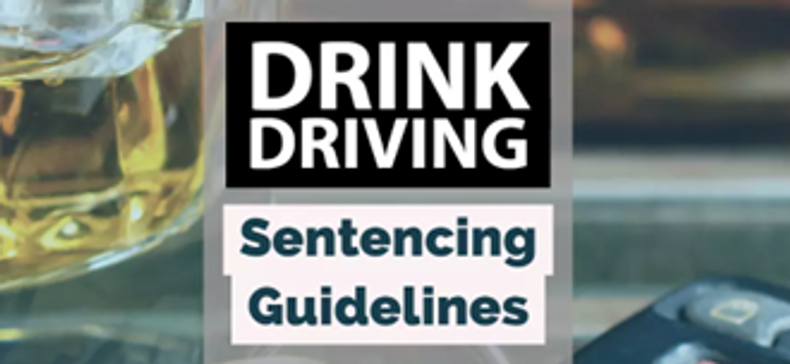Drink driving sentencing guidelines

Legal limit for drink driving in England and Wales
The legal limit for drink driving is :
- 35 micrograms of alcohol per 100 millilitres of breath.
- 80 milligrams of alcohol in 100 millilitres of blood.
- 107 milligrams of alcohol per 100 millilitres of urine.
If a motorist is caught driving and is found to be over the legal limit in breath, blood or urine, they are liable to a drink driving prosecution.
What happens if I do not provide a breath, blood or urine sample?
If the police suspect that a motorist has been drinking, they are entitled to request a breath, blood or urine sample from them.
If a motorist fails to comply with this procedure and therefore fails to provide a breath, blood or urine sample, they will not be prosecuted for drink driving. Instead, they will be prosecuted for failing to provide a specimen for analysis which is an offence in itself. This offence is not taken lightly by the Court and there is a high risk of a custodial sentence.
Drink driving sentencing guidelines
If a motorist pleads guilty or is found guilty after trial for drink driving, the Court will use the sentencing guidelines table to determine what sentence (punishment) they should give. The table can be found here.
The Court will consider the following factors when deciding on sentence.
Breath, blood or urine reading
The table is split into 4 categories depending upon your breath, blood or urine reading. The higher your alcohol reading, the harsher the sentence will be.
When you are arrested on suspicion of drink driving, you will be asked to give a sample of breath, blood or urine. The most common form of alcohol reading is taken using the breathalyser machine at the police station.
Previous convictions
If you have been convicted of drink driving or an offence of a similar nature such as failing to provide a specimen in the last 10 years, this is considered as a serious aggravating factor and the Court will impose a harsher sentence because of this.
If you have been convicted of a relevant offence in the last 10 years, the disqualification period is longer. The disqualification imposed starts from a minimum of 36 months and ranges up to 60 months.
Aggravating factors
Aggravating factors are factors that increase the seriousness of the offence and they will impact upon the sentence given.
Examples of aggravating factors are as follows:
- Carrying passengers
- Driving for hire or reward e.g. taxi drivers
- Involved in an accident/collision
- Evidence of unacceptable standard of driving
- Previous convictions of a similar nature
If the Court believes there are aggravating factors present, the Court may deviate from the sentencing guidelines shown above. The Court can place you into the next bracket up if there are serious aggravating factors such as a collision in which case the sentence can potentially be harsher.
Mitigating factors
Mitigating factors will be presented by an experienced barrister at Court in attempt to achieve a more lenient sentence.
Examples of mitigating factors are as follows:
- No previous convictions/no previous relevant convictions
- If the driver shows remorse and regret
- Cooperating with the police
- An early guilty plea
Disqualification period
If you are found guilty of drink driving there is always a mandatory driving disqualification involved which will have immediate effect. The driving disqualification will be active from the date of your sentence hearing.
The minimum disqualification period given for drink driving is 12 months, there is no way to avoid a driving ban if convicted of drink driving.
Financial penalty
If the Court place you within the bottom two categories of the sentencing guidelines, you may be liable to a financial penalty.
The fine is based upon your weekly income and must be paid to the Court within a specific time frame that will be decided upon at your sentence hearing.
Community order
If the Court place you within the top three categories of the sentencing guidelines, you may be liable to a community order.
A community order is a harsher sentence than a fine. The purpose of a community order is to provide punishment in the community and also rehabilitation and education for the offender.
A community order is dealt with by the probation service and can include unpaid work requirements, curfews and rehabilitation days.
Custodial sentence (prison)
In most serious circumstances, there is a risk that you could go to prison for being convicted of drink driving therefore, it is very important that you instruct an expert lawyer to advise and represent you for such offences.
Should the Court place you in the top bracket of the sentencing guidelines based on your breath, blood or urine reading or aggravating factors, you could be sentenced to up to 6 months in prison.
Should you require representation in Court from Kang & Co Solicitors, please call us on 0345 222 9955 or visit our website.
